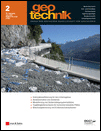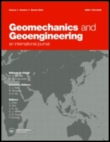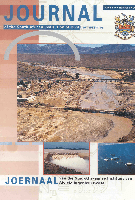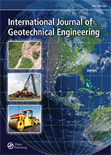
International Journal of GEOMATE
Scope & Guideline
Pioneering research that transforms challenges into solutions.
Introduction
Aims and Scopes
- Geotechnical Engineering and Soil Mechanics:
Research on soil behavior, stability analysis, and the effects of various environmental factors on soil properties, including liquefaction studies and slope stability. - Sustainable Construction Materials:
Development and analysis of eco-friendly materials such as geopolymer concrete, recycled aggregates, and bio-based materials for construction applications. - Hydraulic and Environmental Engineering:
Studies on hydraulic modeling, flood control, and the impact of human activities on water resources, including sediment transport and water quality assessment. - Earthquake Engineering and Risk Assessment:
Investigation of seismic behavior of structures, damage assessment, and retrofitting methods to enhance resilience against earthquakes. - Numerical and Experimental Methods:
Application of advanced computational methods and experimental techniques to analyze structural performance, material properties, and environmental impacts.
Trending and Emerging
- Sustainable and Green Materials:
There is a significant increase in research focused on sustainable construction materials, including the use of recycled waste products and innovations in geopolymer technology. - Resilience and Disaster Risk Management:
An emerging focus on disaster risk management, particularly in relation to earthquake resilience and climate change impacts, is evident in recent studies. - Smart Technologies and Automation in Construction:
The integration of smart technologies, such as IoT solutions for construction monitoring and management, is becoming more prevalent in research publications. - Numerical Simulations and Advanced Modeling Techniques:
There is a trend towards utilizing advanced numerical modeling techniques to simulate complex geotechnical and structural behavior, reflecting a shift towards data-driven approaches. - Interdisciplinary Approaches to Geotechnical Challenges:
Emerging themes show an increasing collaboration between geotechnics, environmental science, and urban planning, addressing multifaceted challenges in modern infrastructure.
Declining or Waning
- Traditional Materials without Sustainable Focus:
There is a noticeable reduction in studies solely focused on conventional materials like ordinary Portland cement without integrating sustainable practices or recycled components. - Limited Studies on Historical Structures:
Research on historical structures and their preservation has decreased, indicating a shift towards modern engineering challenges rather than heritage conservation. - Diminishing Interest in Purely Theoretical Studies:
The journal is increasingly favoring applied research and practical solutions over purely theoretical studies that do not have immediate real-world applications. - Reduced Focus on Localized Environmental Issues:
While environmental engineering remains a core theme, specific localized studies, particularly those focusing on niche geographical areas, are appearing less frequently.
Similar Journals

International Journal of Engineering Research in Africa
Connecting Ideas, Transforming EngineeringThe International Journal of Engineering Research in Africa is a pivotal academic resource for researchers, professionals, and students interested in the multifaceted field of engineering within the African context. Published by TRANS TECH PUBLICATIONS LTD, this journal facilitates the dissemination of innovative research, covering a myriad of topics in engineering, from advanced materials to sustainable practices. With an ISSN of 1663-3571 and E-ISSN 1663-4144, this publication not only fosters scholarly communication but also contributes to the global engineering discourse, as evidenced by its current Q3 ranking in the Engineering (miscellaneous) category in 2023. Operating from its base in Switzerland, the journal has been actively publishing since 2010 and continues to play a vital role in the advancement of engineering knowledge, particularly in the African landscape. Although it does not offer an open access model, the journal's commitment to quality research ensures that it remains a valuable asset for those seeking to understand and innovate within the engineering sector. Its integration in Scopus with a rank of #175 out of 307 in General Engineering further underscores its relevance and impact in the engineering community.

Magazine of Civil Engineering
Pioneering Solutions for Modern Civil Engineering ChallengesMagazine of Civil Engineering, published by ST-PETERSBURG STATE POLYTECHNICAL UNIVERSITY, is a prominent open access journal dedicated to the field of civil and structural engineering. With an ISSN of 2712-8172 and E-ISSN 2071-0305, it serves as a vital platform for disseminating high-quality research, innovative methodologies, and current trends in building and construction. Since its inception in 2010, the journal has embraced open access, ensuring broad visibility and accessibility for its contributions to the academic community. The magazine holds a respectable position in the academic hierarchy, ranked in the Q3 quartile for both Building and Construction and Civil and Structural Engineering categories as of 2023. It is indexed in Scopus, amplifying its societal impact and reach with a rank of #114/223 in Building and Construction and #224/379 in Civil and Structural Engineering. Researchers, professionals, and students alike are encouraged to engage with the cutting-edge studies presented in the magazine, contributing to the advancement of knowledge and practice within the civil engineering domain.

Geotechnik
Championing Research that Shapes the Ground We Build OnGeotechnik, published by ERNST & SOHN, is a prestigious journal in the field of Geotechnical Engineering and Engineering Geology. With its roots tracing back to 1982 and regular publications since then, it provides a vital platform for researchers, practitioners, and students to share and disseminate cutting-edge findings, methodologies, and techniques. The journal's ISSN is 0172-6145 and the E-ISSN is 2190-6653. Notably, it has achieved a commendable Q3 category ranking in 2023, reflecting its contribution to advancing knowledge in its field, as indicated by its Scopus rank of #171 out of 229 in the Earth and Planetary Sciences category. Although it does not offer open access, the journal remains integral for professionals aiming to stay informed about current trends and breakthroughs in geotechnics. Geotechnik strives to underpin its objectives of fostering quality research and encouraging innovation within the geotechnical community, ensuring it remains a crucial resource for all stakeholders involved.

CANADIAN JOURNAL OF CIVIL ENGINEERING
Connecting Researchers to the Heart of Civil EngineeringCanadian Journal of Civil Engineering, published by Canadian Science Publishing, serves as a premier platform for the dissemination of innovative research and development in the fields of civil and structural engineering, as well as environmental science. Established in 1971, this journal maintains a robust reputation, achieving a Q3 ranking in both civil engineering and general environmental science categories as of 2023. While it does not currently offer open access, the journal is accessible to a wide audience of researchers, professionals, and students who are keen to stay abreast of the latest advancements in civil engineering practices. With a significant number of yearly publications and a committed editorial board, the Canadian Journal of Civil Engineering contributes to the foundational knowledge and practical applications in the engineering community, thereby playing a critical role in addressing contemporary challenges in civil infrastructure and environmental sustainability.

Geomechanics and Geoengineering-An International Journal
Advancing the Frontiers of Geotechnical InnovationGeomechanics and Geoengineering-An International Journal, published by Taylor & Francis Ltd, serves as a prominent platform for the dissemination of innovative research and advancements in the fields of Geotechnical Engineering and Engineering Geology. With an ISSN of 1748-6025 and E-ISSN of 1748-6033, this journal has established itself as a critical resource within its category, ranking in the Q2 quartile according to the 2023 metrics and positioning itself in the top 38% of the Scopus rankings for Earth and Planetary Sciences. Geomechanics and Geoengineering encompasses a diverse range of topics, including but not limited to soil mechanics, foundation engineering, rock mechanics, and environmental geotechnics, ultimately aiming to advance both theoretical and practical knowledge in these vital areas. This journal not only highlights pioneering research but also facilitates a platform for academia and industry practitioners to collaborate and exchange ideas. While it does not offer open access, it remains a valuable resource for institutions and individuals committed to enhancing their expertise in the geotechnical domain. With convergence years spanning from 2006 to 2024, this journal is equipped to significantly contribute to the evolving landscape of geomechanical research.

Journal of the South African Institution of Civil Engineering
Exploring sustainable solutions for modern challenges.Journal of the South African Institution of Civil Engineering (ISSN: 1021-2019) is a distinguished open-access publication dedicated to advancing the field of civil engineering in South Africa and beyond. Established by the South African Institution of Civil Engineering (SAICE) and South African Institute of Steel Construction (SAISI), it serves as a critical platform for sharing research, case studies, and industry developments. The journal has been openly accessible since 2015, ensuring broader dissemination of knowledge among researchers, professionals, and students alike. Although it currently holds a Q4 ranking in Civil and Structural Engineering and is positioned within the lower percentiles in Scopus rankings, its commitment to fostering growth in the engineering sector remains strong. Covering various topics from structural design to innovative construction methodologies, the journal invites contributions that push the boundaries of current practices and methodologies. This publication is essential for those invested in sustainable engineering solutions, aiming to collaborate and contribute towards the evolution of civil engineering standards in South Africa.

International Journal of Geotechnical Engineering
Transforming Challenges into Solutions in Geotechnical ScienceThe International Journal of Geotechnical Engineering, published by Taylor & Francis Ltd, is a leading academic platform dedicated to advancing knowledge and research in the field of geotechnical engineering, environmental engineering, and soil science. With an ISSN of 1938-6362 and an E-ISSN of 1939-7879, this journal has established a credible presence since its inception in 2007, reflecting its commitment to academic excellence through rigorous peer-reviewed research. Ranking in the Q2 quartile across several categories—including Environmental Engineering and Geotechnical Engineering—this journal boasts impressive Scopus rankings, placing it among the top publications in its disciplines. The journal seeks to foster a deeper understanding of soil behavior, geotechnical processes, and their environmental impacts, making it an essential resource for researchers, professionals, and students alike. While it operates under a subscription model, the wealth of knowledge and innovative findings disseminated within its pages are indispensable for anyone engaged in this vital field. With an expanding focus on interdisciplinary research and practical applications, the International Journal of Geotechnical Engineering continues to play a pivotal role in shaping the future of engineering practices worldwide.

Revista de la Construccion
Shaping the Future of Construction Through Academic ExcellenceRevista de la Construcción is a pivotal academic journal dedicated to the field of civil engineering and construction, published by the prestigious Pontificia Universidad Católica de Chile, Escuela de Construcción Civil. With its ISSN 0718-915X, this journal serves as a crucial platform for disseminating innovative research, case studies, and advancements in construction methodologies that address contemporary challenges within the industry. While currently not classified as open access, it provides valuable insights benefiting researchers, professionals, and students engaged in construction development and sustainability. The journal enhances the academic discourse and contributes significantly to knowledge in engineering practices, project management, and material science. Based in Santiago, Chile, the journal aims to foster collaboration and knowledge exchange among experts both locally and globally, making it an essential resource for those striving to advance the science and practice of construction.

Periodica Polytechnica-Civil Engineering
Transforming Infrastructure Through Cutting-Edge InsightsPeriodica Polytechnica-Civil Engineering is a prestigious journal published by the Budapest University of Technology and Economics, dedicated to advancing the field of civil engineering through high-quality research and innovative practices. Established in 1972, the journal has transitioned through various phases of publication and now spans an expansive range of topics within civil and structural engineering, geotechnical engineering, and engineering geology. With an impact factor indicating its growing influence and a commendable placement in the Q3 quartile according to the latest 2023 metrics, it recognizes contributions that bridge theoretical advancements with practical applications. While currently not open access, the journal remains a vital resource for researchers, professionals, and students seeking to stay abreast of the latest developments in engineering design, construction techniques, and geotechnical innovations. The continuous publication of significant research after almost five decades underscores its commitment to disseminating knowledge crucial for the world’s infrastructure challenges, making it an essential reference point within the engineering community.

Journal of Materials and Engineering Structures
Innovating the Future of Materials ScienceJournal of Materials and Engineering Structures is a pioneering Open Access journal published by MOULOUD MAMMERI UNIVERSITY OF TIZI-OUZOU, dedicated to advancing the field of materials science and engineering. Since its inception in 2014, the journal has aimed to provide researchers, professionals, and students with a platform for sharing cutting-edge research and innovative applications in materials engineering and construction structures. Although the HIndex and Scopus ranking data are not specified, the journal plays a crucial role in disseminating knowledge that contributes to the development of sustainable and efficient engineering practices. With its commitment to accessibility and knowledge sharing in the heart of Algeria, the Journal of Materials and Engineering Structures is poised to make a significant impact on both local and global academic communities.